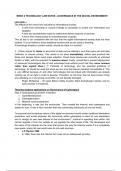WEEK 2 TECHNOLOGY LAW NOTES - GOVERNANCE IN THE DIGITAL ENVIRONMENT
Last week…
The effects of the move from industrial to informational society:
- A shift from ownership or control of things to ownership or control over information (not
tangible).
- A new and revolutionary model to market and deliver products or services.
- A move from rivalrousness to nonrivalrouness of goods.
This all has to be considered with the fact that the digital informational society does not have
borders. It is not limited to those traditional borders that we are used to knowing.
If technology enables a certain activity, should we allow it in society?
“[…]There should be limits on what kind of data can be collected, such that users can limit data
collection or choose privacy. This needs to be done immediately, before new products like
Alexa and Google Home reach mass adoption. Smart home devices are currently an untamed
frontier of data, with the potential for massive abuse. Lastly, I would like to prevent deployment
of advanced technologies like AI and automated bots without proof that they serve humans
rather than exploit them.[…]”: Potential of technology and the potential problems of
technology: AI should be used but when we are sure that serves mankind not explodes it. This
is very difficult because AI and other technologies that are linked with information are already
making use of our data in order to develop. Therefore, by the time, that we have known if they
are exploding us or are giving us benefits, we are already damaged.
- Roger McNamee – 35 years Silicon Valley investor, Mark Zuckerberg’s mentor, and an
early investor in Facebook.
Theories (expose application) on Governance of Cyberspace
How is Cyberspace governed? 3 theories:
1. Cyberlibertarianism
2. Cyberpaternalism
3. Network communitarianism
In the beginning, it was just the technicians. They created the internet, and cyberspace and
started to work. It was a new invention that was connecting individuals all over the world.
“Incorporeal and borderless nature of the digital environment would render traditional lawmakers
powerless, and would empower the community within cyberspace to elect its own lawmakers
and to design its own laws tailored to that environment.”: Internet is operating from within. We
cannot regulate it from the outside as we regulate the other areas of life. The developers and
the users of the internet are the ones that govern the way the internet works. It is a completely
new space, where the real world rules do not exist anymore.
- J.P. Barlow 1998
- In 1998, there was the internet but it was not as widespread as today.
, Cyberlibertarianism (Based on the ideas of Barlow):
Cyberspace is a separate sovereign space where real-world laws and real-world governments
are of little or no effect. Cyberspace is a completely different new sovereign area.
Weaknesses and arguments:
If you want to regulate the internet within, you need a community of users that share the same
information. On the basis of this same information is able to take a decision in a democratic way.
However, we use a lot of filters when we access the internet. Therefore, the information that we
receive is not the same. Also, the people with who we interact are not the same.
Cyberspace lacks:
- Homogeneity: Because of these filters, these different interests, and the interactions with
different people.
- Internal democratic discourse: There is a lot of fragmentation within Cyberspace.
Conclusion: Cyberspace cannot be effectively regulated from within. The Internet cannot be
regulated by itself.
Consequences of cyberlibertarianism:
If certain content is prohibited in one country but not in the other, individuals would access
online the content in the country it is allowed. => Regulatory arbitrage (people will access
websites or do certain activities in the space which is allowed. Therefore, if it is not possible to
express yourself about certain issues in the Netherlands, then you do it in a forum webpage in
another country, even though, you are physically located in the Netherlands). According to this
theory, the rules of the country should not prohibit you from doing so because you are not in the
country but in cyberspace. You have moved away from the country’s jurisdiction.
- We cannot regulate it from the outside.
- States rules do not apply.
Cyberpaternalism:
Cyberspace is not immune from regulatory intervention by real-world regulators. The ones that
create the cyberspace are physical people (men). If we want to regulate it we need to look at
two specific aspects of cyberspace.
Joel Reidenberg (one of the first supporters) – what needs to be regulated?
- First, contractual agreements between various internet service providers.
- Second, the new internet architecture which is man-made and within our control.
If we are able to regulate these two things, then we are able to regulate the cyberspace.
It would be the physical nation legislators the ones that would regulate these agreements and
the architecture.
Lex informatica
All the ideas of Cyberpaternalism were written down in the Lex informatica showing how the
national governments are not going to lose their power in the cyberspace but they would just
change the way in which they operate. In the physical world, governments are governing
individuals, for the Lex Informatica, in the Cyberspace, they are going to govern the architecture
of the internet and the agreements between internet service providers.




